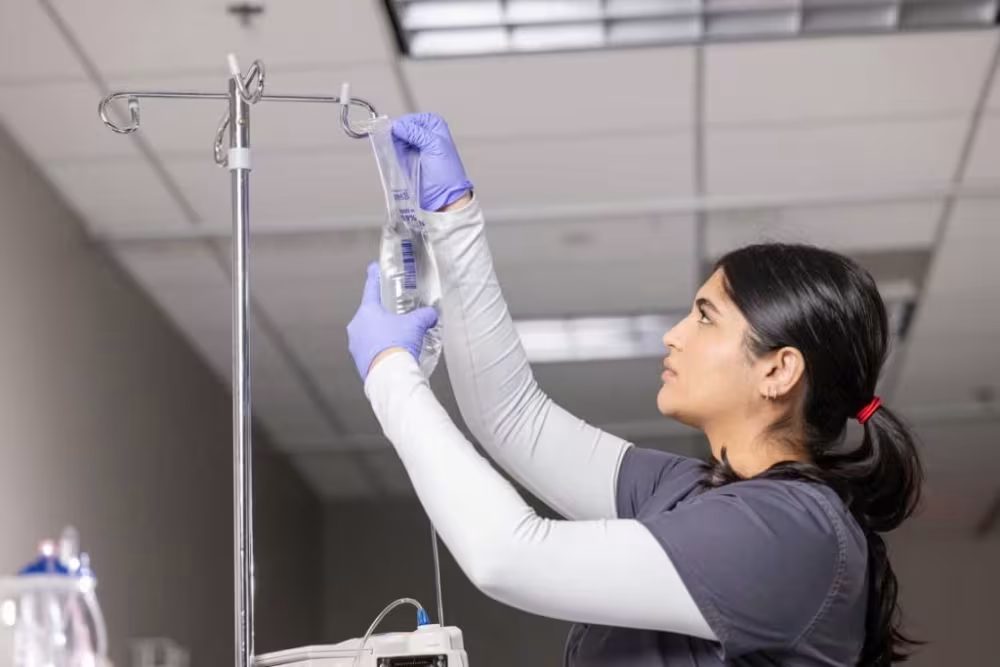Nursing School vs Medical School: Choosing a Path for Your Healthcare Career
Each blog post is dated and contains accurate information as of that date. Certain information may have changed since the blog post publication date. If you would like to confirm the current accuracy of blog information, please visit our ABSN track overview page or contact admissions at 844.347.2108.
What is the difference between nursing school and medical school? Nursing and physician roles are in demand and essential to the patient care experience. Nurses have more regular contact with patients and administer day-to-day care, while physicians have less direct patient interaction and determine the overall course of care.

Nurses and physicians are two of the most important roles in the healthcare field when it comes to patient care. Each role comes with distinct tasks and responsibilities, but organizations would not be able to deliver effective or potentially life-saving care to patients without cooperation among all care team members.
What are the characteristics of nursing school vs medical school, and what do these educational pathways look like? Mercer University’s Second Degree Accelerated Bachelor of Science in Nursing (ABSN) track in Atlanta, Georgia, offers a comprehensive nursing curriculum that can be completed more quickly than the education required to become a licensed physician. After enrolling in one of three annual start dates, in as few as 12 months, you could graduate ready to take the NCLEX-RN and become a licensed registered nurse (RN).
Learn more as we review the differences in education between nurses and physicians, and how these roles compare on a day-to-day and overall career basis.
Nursing School vs Medical School: Comparing Educational Pathways
Depending on which career path you want to pursue, you will work through different educational pathways. Many fundamental subjects and patient care principles remain the same, but the curriculum you work through and how long it takes to attain licensure will be quite different.
Nursing School vs Medical School Curricula
Nursing track curricula are challenging but fairly direct, with a faster route into practice than medical students have. Traditional BSN programs take four years, but an ABSN track for those who already have a non-nursing bachelor’s degree is even faster. Mercer’s ABSN track can be completed in as few as 12 months. Our curriculum is designed to graduate practice-ready candidates ready to sit for the NCLEX-RN licensure exam.
- Online accelerated nursing coursework delivered via an e-learning platform accommodates multiple learning styles. This online coursework is more flexible while still requiring students to meet deadlines.
- Nursing simulation labs and skills labs create a hands-on environment to learn procedures and hone clinical acumen with peers.
- Clinical rotations at top Metro Atlanta healthcare facilities build key nursing skills through clinical experiences under instructor supervision.
Prospective physicians will need to study an extensive range of material during undergrad and med school. Each of these will have a separate curriculum for students to work through. Undergraduates take “pre-med” majors across biological, physical, and social sciences, including:
- Biochemistry
- Biology
- Chemistry
- Neuroscience
- Psychology
After earning a bachelor’s degree and enrolling in medical school, students must complete a further four-year curriculum. Further science courses provide foundational knowledge during the first two years, while the second two years are much more focused on gaining clinical knowledge and experience. Residency requirements can vary depending on the specialization you pursue.
Timelines to Become an MD or RN
Aspiring physicians will most likely go from starting a bachelor’s degree to attaining licensure in 11 to 16 years. This includes four years of undergraduate study, four years of medical school, and three to eight years of residency training, depending on the specialty they pursue.
Nurses do not go to med school, so the academic journey for RNs begins with earning a nursing degree. This means either an Associate Degree in Nursing (ADN) or a Bachelor of Science in Nursing (BSN). Although both degrees qualify students to take the NCLEX-RN, most employers prefer a BSN, with an increasing trend of hiring only bachelor’s-educated nurses. Nurse practitioners earn a Master of Science in Nursing (MSN) degree, which requires additional schooling after earning a bachelor’s degree.

Learn more about the differences between BSN and MSN degrees.
A traditional BSN degree path requires four years of undergraduate study, but students who have earned a previous non-nursing bachelor’s degree can apply to an accelerated nursing track like Mercer’s. You may have to complete prerequisite courses depending on your previous academic experience, but once enrolled, you will be able to earn a BSN degree in as few as 12 months.
After earning your degree, you can take the NCLEX-RN and attain licensure. Although the path to becoming a nurse is longer than just 12 months, an ABSN track like Mercer’s is one of the fastest ways to transition into a nursing career.
Career Roles and Responsibilities as a Nurse or Physician
Both roles are crucial for patient care, and they are most effective when working together to create the best health outcomes. Nurse and physician responsibilities complement each other, and the day-to-day realities of these roles can influence which path is right for you.
Nursing Role
RNs work across most healthcare settings, carrying out the patient care plan while communicating and watching out for any changes in their condition. This includes:
- Administering medication
- Assisting patients with everyday activities
- Communicating status to fellow care team members, including physicians
- Monitoring vital signs
- Preparing patients for procedures
- Recording patient information
As the professionals with the most face-to-face time with patients, nurses also educate patients and families about their treatment and advocate for their best interests. If you crave hands-on work with patients, then nursing might be right for you.
Physician Role
Physicians complete advanced training that allows them to diagnose medical conditions and prescribe treatments, while nurses bring critical clinical expertise and patient care experience to the healthcare team. Their professional scope includes the full management of a patient’s health, as well as tasks like:
- Developing treatment plans
- Interpreting lab or imaging results
- Performing examinations
- Prescribing medications
- Referring to specialists
Physicians typically focus on diagnosis and treatment planning, often working at a broader level of oversight, while nurses play a central role in direct patient care and ongoing support. If you are drawn to shaping care plans and guiding medical decisions, a physician career path may align more closely with your goals.
Nursing and Physician Career Outlook
Both nursing and physician roles have a positive career outlook driven by demand, with many opportunities for specialization and advancement after entering the field as a licensed professional.
According to the U.S. Bureau of Labor Statistics, nurses earn a median salary of $93,600 per year, with salary ranges often depending on the geographic area you choose to practice in. There will be an expected nursing employment increase of 6% by 2033, adding an estimated 197,200 additional nurses to the healthcare workforce during this time. Those who undergo additional education and certification after becoming an RN can become nurse practitioners (NPs), who earn a median salary of $126,260. An estimated 141,200 NPs will enter the workforce by 2033, a growth of 40%.
If you’ve already earned a biology degree, see how you can quickly transition into nursing.

Physicians are estimated to earn a wage equal to or greater than $239,200 per year, with variations depending on geographic area and specialization within the field. By 2033, we are likely to see the field grow by 4%, adding approximately 34,500 new physicians to the workforce during this time.
Both career paths offer unique opportunities, from the education and training required to the responsibilities and rewards of each role. The right path depends on your goals, interests, and how you envision your future in healthcare—whether you are eager to begin working with patients sooner or pursue advanced training for a broader scope of practice.
Ready to Pursue Nursing With Mercer ABSN?
Considering nursing school vs medical school? Mercer University’s ABSN track offers a faster path to a nursing career. Connect with an enrollment counselor to discuss your eligibility and see if Mercer’s ABSN track aligns with your goals.
